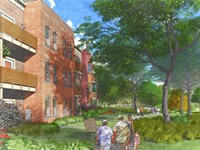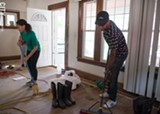[
{
"name": "500x250 Ad",
"insertPoint": "5",
"component": "15667920",
"parentWrapperClass": "",
"requiredCountToDisplay": "1"
}
]
City Roots Community Land Trust has reached a milestone that's been long in coming: creating a way for low-income people to buy their own homes.
Although the non-profit was formed in 2017, the catalyst for City Roots was a protracted battle that began about five years earlier between Liz McGriff, a homeowner on Cedarwood Terrace in the Beechwood neighborhood, and the lender who foreclosed on her property.
After years of resisting eviction and tough negotiations with the lender, McGriff reached an agreement that allowed her to retain ownership of the house with affordable terms. She transferred rights to the land to City Roots in the agreement.
The struggle highlighted the plight of homeowners trying to negotiate with lenders. It also helped galvanize public awareness about Rochester's affordable-housing crisis. Now City Roots has begun acquiring houses that it will repair and sell to first-time, low-income buyers in an effort to address the problem. The homes will be sold at below market value, says Joe Di Fiore, president of City Roots' board of directors. Another property in the Beechwood neighborhood is already being rehabbed.
Our goal is to do 10 in the next two years," Di Fiore says.
Community land trusts have become more popular in cities around the country with Burlington, Vermont-based Champlain Land Trust among the most well-established. CLTs can create housing opportunities for people with extremely modest incomes in ways that the free market can't, Di Fiore says. They're typically organized and managed by community members who serve as guardians of land and how it's developed – primarily for what Di Fiore calls "deep affordability."
Di Fiore, who has a long history of affordable housing advocacy, says he isn't against recent housing projects downtown. But much of it, even housing that's described as affordable, is out of reach for many city residents, he says.
"There's a serious market gap issue in Rochester," Di Fiore says.
Housing experts widely recommend that a buyer or renter's monthly housing costs shouldn't exceed 30 percent of their income. But a 2017 analysis by Housing Justice for All indicated that more than 50 percent of the residents in the Rochester region pay more than 30 percent of their income on housing, and 26.5 percent pay more than 50 percent.
Also, owner occupancy isn't high in the city. Nearly 70 percent of city residents are renters, according to city data. Every year, thousands of eviction notices are filed in City Court.
More has to be done to meet the housing needs of low-income city residents, Di Fiore says, because there's not enough financial incentive for market-rate developers to do it.
City Roots' approach begins with buying a house well below market value and then bringing it back to good condition. For instance, a property may be purchased for $10,000 in a neighborhood where houses in good condition sell for $80,000. City Roots will make the necessary repairs and improvements and then resell it to a qualified buyer at a price that will cover City Roots' costs and will still be lower than the market rate. If the new owners eventually sell the property, they'll pay off a loan that was small to start with, and they'll share part of the property's appreciation with City Roots.
Safeguards will be in place to ensure that the buyer can afford to make the payments on the property. City Roots would be alerted if the new owners miss a mortgage or tax payment. Di Fiore says City Roots would work the owners to help them get through their financial problem, if possible.
City Roots has assembled a crew of volunteers to do all of rehabbing, Di Fiore says. To make the resale formula work, the properties have to bought well below market value, and they can't cost too much to update.
"We're not looking for properties that are falling in," Di Fiore says.
Some of the homes will be purchased, and some wil be acquired through donations and agreements with other non-profits like the Genesee Land Trust and St. Joseph's House of Hospitality.
City Roots is focusing on specific neighborhoods that are predominantly home to low-income, working-class people, such as Marketview Heights, Beechwood, PLEX (Plymouth Avenue-Exchange Street), and EMMA (the East Main Street, Atlantic Avenue, and Mustard Street area).
Most of the people living in those neighborhoods are renting, and some want to own a home, but affordability is often a barrier. City Roots' mission is to make housing affordability a priority so that people can invest in their neighborhoods instead of being displaced by gentrification, he says.
Single-family houses, apartments, even commercial property or storefronts: City Roots is considering all of these, Di Fiore says. City Roots has a long-range plan, because Rochester's affordable housing crisis is not going away anytime soon, he says.
City Roots and other affordable housing and tenants rights advocates have appealed to the city administration to pressure developers to include more affordable housing in their projects, Di Fiore says.
"There is some recognition for a need for a comprehensive plan," he says. "But we can't just say that we need deeply affordable housing. We have to find ways to make it happen."
Speaking of...
-

The state of the neighborhoods
Jun 5, 2019 -

Judge dismisses Cobbs Hill Village suits
May 3, 2019 -

Activists plan rally highlighting Rochester's housing problems
Apr 10, 2019 - More »
Latest in News
More by Tim Louis Macaluso
-

RCSD financial crisis builds
Sep 23, 2019 -

RCSD facing spending concerns
Sep 20, 2019 -

Education forum tomorrow night for downtown residents
Sep 17, 2019 - More »






